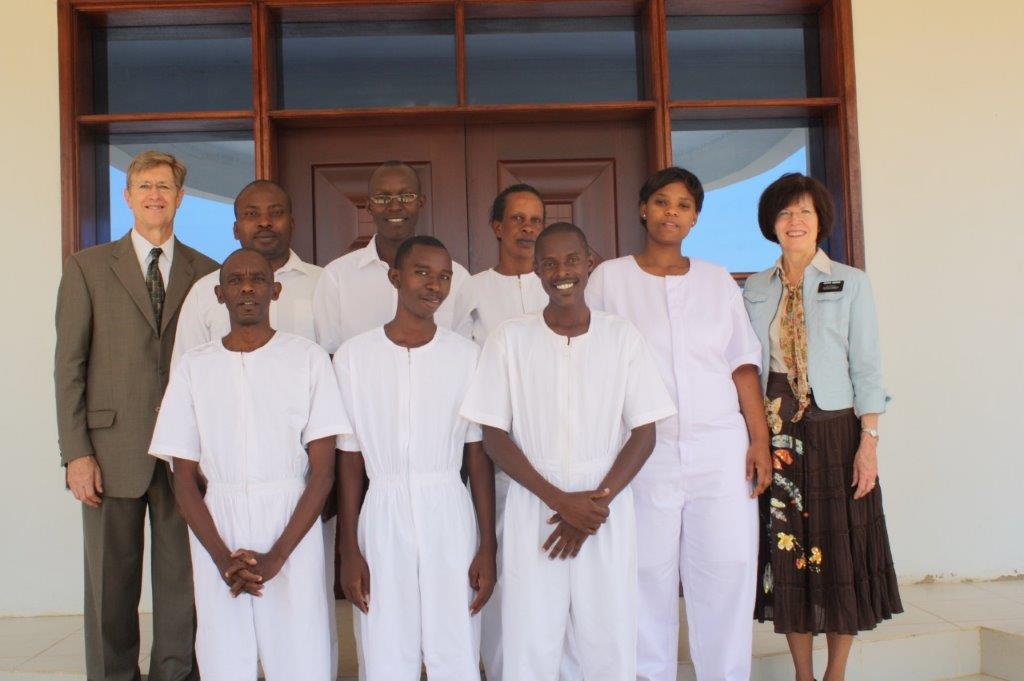For more information on the “Not by Bread Alone: Stories of the Saints in Africa” series, go to https://notbybreadalonefilm.com/en/
For more information in French, go to https://notbybreadalonefilm.com/fr/
To see all of our posts about The Church in Africa, go to https://dev.interpreterfoundation.org/category/africa/

Elder and Sister Brent and Cheri Andrus in 2010 with a group of baptismal candidates in Kigali, Rwanda. Charles Kayibanda is pictured on the front row at left.[1]
Thanks for taking the time to look at this first blog post for “Not by Bread Alone”!
Let’s begin with an age-old question: “When does God smile knowingly?” Answer: “When mortals make plans.”[2]
As a first example of that principle, you might have noticed that the subtitle for the website has changed from “Stories of the Saints in the DR Congo” to “Stories of the Saints in Africa.” What’s that all about?
Well, we are thrilled to announce that thanks to the interest and generosity of our friends, Brent and Cheri Andrus, the borders of the project have now been enlarged to include Rwanda. Brother and Sister Andrus have already been helping us identify Rwandan pioneers, many of whom they taught and baptized in 2010–2011 when they served as the first missionary couple in the country.
At that time, Rwanda was part of the Uganda Kampala Mission. It had remained closed for missionary work due to the 1994 genocide that took the lives of nearly one million people. The Andrus’ assignment was to lay the groundwork for the Church to be registered and recognized by the government. During their time in Rwanda, they carried out humanitarian projects, built relationships with government officials, and supported a single, small branch of the Church in the capital city of Kigali. The branches have now multiplied into a district and Kigali serves as a mission headquarters.

Family members after receiving ordinances at the Kinshasa DR Congo temple on 22 May 2019. Six adult children and two toddlers were sealed to their parents. Front (left to right): Mukarere Mariam, Kayitare Emile, Rwamucyo Eugene. Back: Bizimana Emmanuel, Muhongayire Beathe with Naledi Bizimana Kayla (baby), Mukacyubahiro Scolastique, Mukakarera Anne Marie, Kayibanda Charles, Makambaza Gilbert with Teta Aganze Grace (baby), Uwirigiyimana Oliva.[3]
What a thrill it will be to tell the story of these and other faithful Rwandan Saints! We hope to begin filming there May or June 2024, during the dry season.
Thanks to the Andrus couple and to each of you, we’re grateful indeed to be off and running—but, as with everything else in life, exactly to where… only God knows. We’re happy to leave it in His hands.
References
Bartlett, John, and Geoffrey O’Brien, eds. 1855. Familiar Quotations 18th ed. New York City, NY: Little, Brown and Company, 2012.
Bernstein, Ignatz. Jüdische Sprichwörter und Redensarten (Jewish Proverbs and Sayings). 4 vols. Vol. 3. Warsaw, Poland; Frankfurt, Germany: J. Kauffmann, 1908. https://archive.org/details/bernsteini1908judi3/. (accessed September 6, 2023).
Cervántes Saavedra, Miguel de. 1605. El ingenioso hidalgo don Quixote de la Mancha (Parte Segunda, Tomo IV) Madrid, Spain: Don Joaquin Ibarra, 1758. https://archive.org/details/hidalgodonquix04cerv. (accessed September 6, 2023).
Kempis, Thomas à. 1441. The Imitation of Christ: A New Reading of the 1441 Latin Autograph Manuscript. Translated by William C. Creasy. Macon, GA: Mercer University Press, 2007. https://books.google.com/books?id=JI7AA0GAbUgC. (accessed September 6, 2023).



Do you anticipate doing other similar projects in Africa?
We would love to extend the project to additional places in Africa. It is just a matter of having the means,